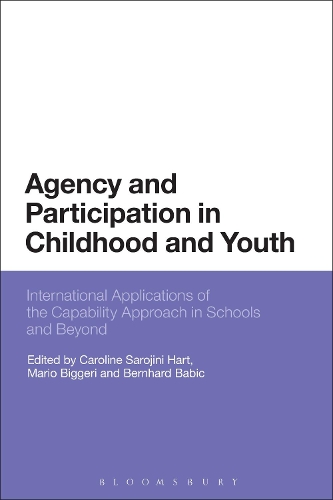
Agency and Participation in Childhood and Youth: International Applications of the Capability Approach in Schools and Beyond
(Paperback)
Available Formats
Publishing Details
Agency and Participation in Childhood and Youth: International Applications of the Capability Approach in Schools and Beyond
By (Author) Dr Caroline Sarojini Hart
Edited by Professor Mario Biggeri
Edited by Mr Bernhard Babic
Bloomsbury Publishing PLC
Bloomsbury Academic
27th August 2015
United Kingdom
Classifications
Professional and Scholarly
Non Fiction
370.1
Physical Properties
Paperback
296
Width 156mm, Height 234mm
417g
Description
Agency and Participation in Childhood and Youth presents new critical engagement in conceptualising the roles of youth agency and participation in education, development and the pursuit of social justice. Theoretically, the book is framed within the paradigm of the capability approach, initially developed by Nobel Laureate, Amartya Sen, and further differentiated by others, including philosopher, Martha Nussbaum. The book unravels the complex relationships between the nature of youth agency and participation, in education, but also in wider political, economic and social arenas, and the potential of young people to expand their freedoms to lead lives they have reason to value. It is thus argued that ethical, sustainable development is contingent on the nature of youth agency and participation in schooling and further afield. Bringing together leading international experts researching childrens capabilities, Agency and Participation in Childhood and Youth offers a unique exploration of links between exciting new areas of development in theory, research and practical applications of Sen and Nussbaums ideas. The book addresses a significant gap in the literature drawing on empirical data from the UK, the USA, Jordan, Palestine, the Democratic Republic of the Congo, Switzerland, New Zealand and beyond, with perspectives presented from both within and outside schools and other formal educational settings. Agency and Participation in Childhood and Youth is of particular interest to academics, teaching professionals, undergraduate and postgraduate students of education studies, social policy, youth and development studies.
Reviews
In this important and challenging book the authors make a strong case for the capability approach as a framework for promoting real freedom, and for applying that concept to a social category which is treated as far less than human, children. This book is a powerful argument to look at childhood, education and youth through the capability lens and treat children with the dignity and respect to which they are entitled. It is a demanding new agenda for the interaction between children and adults. We must cease seeing children as adults in waiting, and see adulthood as dependent upon the development of real freedoms in children. -- Koy Thomson, Chief Executive, Children in Crisis
In linking the concepts of capability and agency together this book provides a fresh and innovative approach to understanding children's lives in and outside schools. Drawing on insights gleaned from international contexts, the contributors to this volume offer new ways in which to promote greater social justice and participation for children that is a welcome addition to the childhood studies literature. -- Allison James, Professor of Sociology, University of Sheffield, UK
This is a welcome and timely addition to the growing literature on capabilities and children and young people. The international perspective is welcome but the greatest appeal of the pieces gathered together here is in their universal insight into how the capability approach can be increasingly applied to redefine the challenges some children face, and to reframe the parameters of the debate about what is possible to overcome them. Anyone with an interest in how children flourish and thrive through and in education will find the clarity with which the potential of the capability approach is described here to be both fascinating and challenging. Educationalists, researchers and policy makers will recognise in this collection both a new way of thinking about education, its value and purpose and a vital re-statement of the centrality of children and young peoples participation in making education a genuinely fulfilling and transformative experience. -- Fergus Crow, Director of Partnerships, National Children's Bureau, UK
Author Bio
Caroline Sarojini Hart is Senior Lecturer in Education at Sheffield Hallam University, UK, and Affiliated Lecturer in Education at the University of Cambridge, UK. Mario Biggeri is Associate Professor of Development Economics at the University of Florence, Italy. Bernhard Babic is an independent social development consultant and researcher, and Senior Project Manager for Caritas, Germany.
